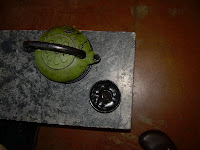 I do a lot of my writing in coffee shops.
I do a lot of my writing in coffee shops.And in libraries.
So I wanted to say, thank you,
to these various places.
And to coffee in general.


This here to the right is not my coffee shop. This is Les Deux Magots which is in Paris, and where Simone de Beauvoir, Jean-Paul Sartre, Ernest Hemingway, Albert Camus and Pablo Picasso hung out.
They probably drank coffee there. Though I may be fooling myself and they may have just drunk absinthe and brandy and got plastered.
My own coffee shop is in Virginia, but the principle is the same. Except for the possibility of getting plastered with attentive waiters and croissants and the literati of Paris as company.
Here's my coffee shop menu of coffees. You can see we are all extensive and international and sophisticated.
It's pretty good coffee though.
And the baristas have piercings, which makes it authentic.
This is the sofa where I hang out . . . see my computer, hanging out, and that there on the floor is the bag I carry the computer around in.
 This is my coffee shop coffee, which I drink in the morning. It smiles at me.
This is my coffee shop coffee, which I drink in the morning. It smiles at me. My coffee likes me.

I need coffee,
btw.
Really.
But I also like tea.
 Here is my coffee shop tea, which is what I get in the afternoon, so I will be able to sleep at night.
Here is my coffee shop tea, which is what I get in the afternoon, so I will be able to sleep at night.I will not say my conscience is entirely clear, but mostly it is having too much caffeine that keeps me up at night, rather than regrets for a misspent youth in the tenor of, 'and yet I could accuse me of such things,' though there is some of that too.
My tea comes in a very heavy iron pot with a very heavy iron cup. I think they are enameled and this is authentic Chinese tea drinking in which I indulge.
The electronics that surround me are much smarter than I am. Sometimes my food and drink is smarter as well.

This is the other place I write. The library.
I don't know why I go there to write since they don't buy my books.
I do not drink coffee, tea, strong liquor, or indeed anything at all at the library.
They do not allow WATER in the library. Maybe they think we will get into food fights or something.
 The parking lot of the library is particularly lovely.
The parking lot of the library is particularly lovely.The interior of the library, however, is like every other library nowadays.
Why do all libraries look alike?


For instance. Here is a picture of the Bullock Fire Department in Bullock, North Carolina.
What we have here is some individuality.

If libraries would serve coffee, we would all be better off.










































